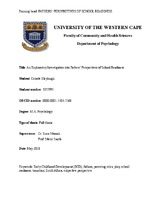| dc.contributor.advisor | Munnik, Erica | |
| dc.contributor.author | Meyburgh, Celeste | |
| dc.date.accessioned | 2018-09-26T07:26:07Z | |
| dc.date.available | 2018-12-31T22:10:06Z | |
| dc.date.issued | 2018 | |
| dc.identifier.uri | http://hdl.handle.net/11394/6419 | |
| dc.description | Magister Artium - MA (Psychology) | |
| dc.description.abstract | In recent years, the global focus on Early Child Development (ECD) has delivered mounting
evidence of it being one of the most rewarding areas of investment a country can make. A central
outcome of quality ECD is to provide sufficient support to enable a child to arrive at Grade 1
ready to learn. Environmental factors impacting on child development and school readiness have
thus been under increasing scrutiny. Although studies have delivered evidence of fathers' unique
contribution to ECD, fathers' impact on a child's school readiness is often overlooked. The
overall aim of this thesis was to report on the findings of the exploratory investigation on fathers'
perspectives of school readiness. All relevant ethics principles were observed in the study. The
study received ethics clearance from the Senate Research Committee (HS/16/5/41). The study
followed an explorative design incorporating qualitative methodologies for data collection and
analysis. Semi-structured interviews were conducted with a sample of nine fathers residing in
Cape Town, who had full parental rights and responsibilities for their child in Grade R. Thematic
analysis produced three themes with subthemes. The core findings suggested that first, fathers
did not have a good fund of knowledge about school readiness and child development. Personal
context and subjective experiences impacted or informed their views and beliefs about school
readiness. Second, feedback from teachers and professionals was highly valued and was a
primary source of information about their children's school readiness. Third, facilitating school
readiness involved different systems and role players of which fathers are important role players.
It emerged that in some ways the role of fathers remains undervalued and in others, fathers'
ability to participate is diminished due to their fund of knowledge, gendered patterns to child
rearing and engagement with school systems. | |
| dc.language.iso | en | |
| dc.publisher | University of the Western Cape | |
| dc.subject | School readiness | |
| dc.subject | Early childhood development | |
| dc.subject | Parenting roles | |
| dc.subject | Fatherhood | |
| dc.subject | South Africa | |
| dc.title | An exploratory investigation into fathers' perspectives of school readiness | |
| dc.rights.holder | University of the Western Cape | |

